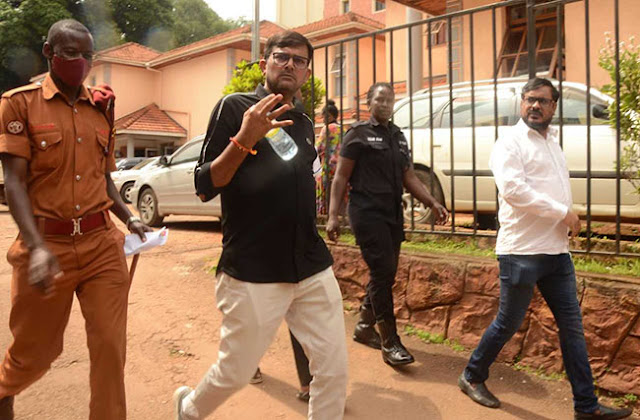In a surprising change of events, a group of Indian businessmen who were sentenced to Luzira jail last week for their involvement in a huge tax evasion network were released after paying a pittance of Sh 20 million.
Jigar Chandarana, 44, and Mr. Jitendra Sorathiya, 41, of Wellex General Hardware in Nansana, as well as their accountant, Mr. Ronak Moradiya Ghanshyambhai, 25, appeared before the Anti-Corruption Court in Kololo last week and were charged with five counts of creating and selling fictitious invoices, resulting in a significant financial loss for the Ugandan government.
The three admitted to five offences, including lying to a tax official in violation of Section 58 of the Tax Procedures Code Act of 2014. They also paid Shs102 million in taxes.According to investigations, the fraudsters amassed a substantial quantity of money through the network by enlisting new clients with whom they sold fake bills and earned big commissions.
One of the syndicate's beneficiaries is China Railway No.3 Engineering Group Limited, a well-known global engineering corporation.
According to the information gathered, China Railway No.3 Engineering Group Ltd claimed input VAT of UGX. 211,869,259 on fictitious purchases of UGX. 1,117,051,439, causing the Ugandan government to lose money.
China Railway is a wholly owned subsidiary of China Railway Group Limited, one of the world's largest construction businesses that is listed on the Shanghai and Hong Kong stock exchanges and is a Fortune Global 500 company.
According to the results, between 2018 and 2023, Jigar and his partners, who are directors of Wellex General Hardware in Nansana, filed these false invoices as manufacturing VAT.
However, their prospects were dashed when URA investigators raided their store and imprisoned them in the aftermath of a tax inquiry that began in 2022 when the tax agency learnt about an Indian businessman accused of exchanging tax bills among VAT-registered enterprises.
The Anti-Corruption Court in Kololo found the group guilty on five counts of submitting false information to a tax officer, a violation of Section 58(1)(a) of the Tax Procedures Code Act of 2014, as well as generating and selling phony invoices.
Each defendant was given the option of paying a UGX 20,000,000 fine or facing five years in jail if they did not. According to URA personnel who communicated with this website about the matter, they were successful in both apprehending the criminals and recovering money in the form of taxes from them.
They claimed to have successfully collected UGX 102,878,055 in taxes, which Wellex Hardware Limited agreed to pay in full.
So the crucial issue is whether or not to deport.
Is a Shs 20 million fine, which is little in relation to the money the cartel has made through illegal trading, enough to allow these international criminals off the hook? Alternatively, they should be deported as a precaution because there is no way of knowing if they would conduct the same act again.
"Once a thief, always a thief," an old African adage, demystifies how tough it is for someone to give up a specific character or conduct.
This suggests that courts usually dismiss assertions made by criminals charged before judges that they are "first-time offenders" who should be exonerated. They are either punished severely or sentenced. We want to teach them a lesson while they are in jail.
A light sentence has the disadvantage of being deceptive. The perpetrator repeatedly repeats the same offense. In other words, offenders who receive minor sentences are being prepared to perpetrate big crimes.
Tax omissions
Uganda loses between 30 and 39% of the revenue generated by the Value Added Tax (VAT). This data is presented in a paper titled "The Value Added Tax Gap Analysis for Uganda" produced by Economic Policy Research Centre (EPRC) researchers Corti Paul Lakuma and Brian Sserunjogi.
According to the research, there is a 30 to 39% compliance gap between actual revenues collected and prospective revenues that might have been generated given the regulatory framework in place at the time.
The expected discrepancy is comparable to that found in Latin American countries and greater than that reported in Sub-Saharan Africa. According to the experts, the expected compliance gap has risen to 64% of potential revenue in previous years.
Manufacturers had significant compliance deficiencies detected. Potential VAT revenues are expected to surpass actual VAT collections in the manufacturing, construction, wholesale and retail trade, water supply, other social services, and arts, entertainment, and leisure sectors.

